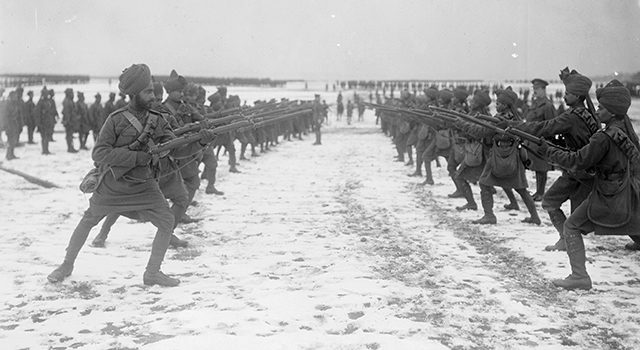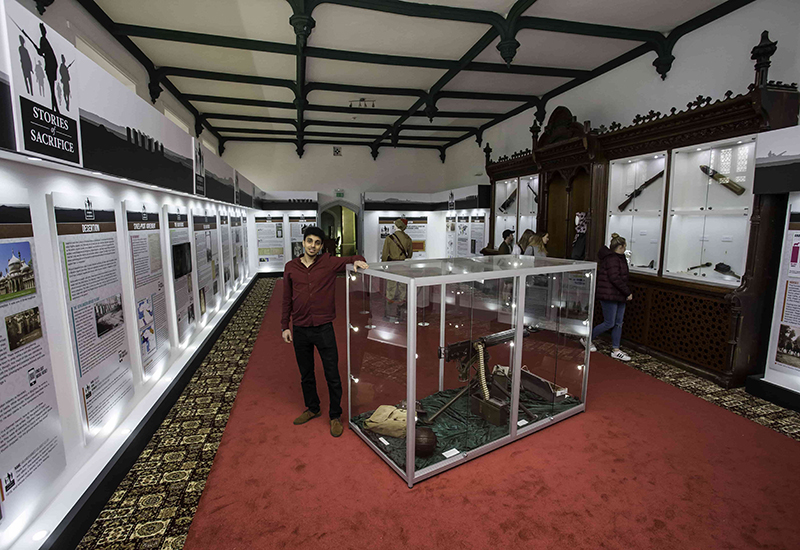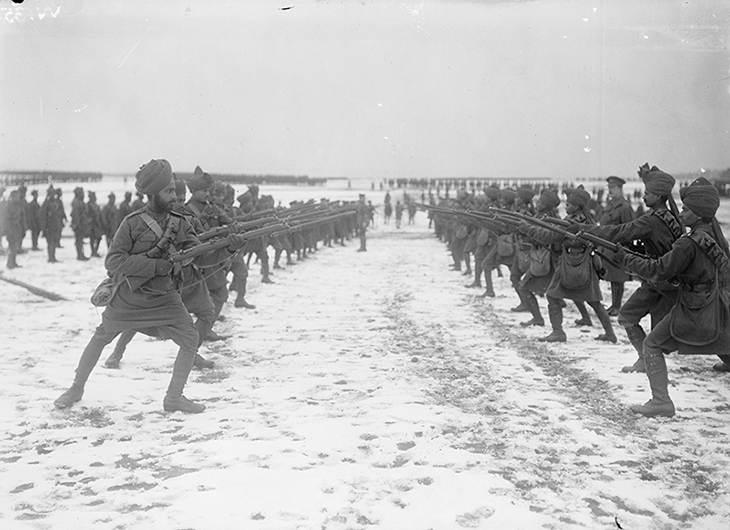Articles

No Comments
By Voices
On 29, May 2018 | No Comments | In Commemoration | By Voices
‘Lest we Forget’: Muslim Service in the Great War
Chris Hill, Birmingham City University
‘Stories of Sacrifice’, an exhibition run by the British Muslim Heritage Centre about Muslim service in the First World War, was met with a note of surprise by visiting Muslims from across the UK.
Dr Islam Issa, curator of the exhibition and lecturer in English at Birmingham City University, recalled how e-mails and letters from descendants of Muslim soldiers were full of gratitude, often with the qualification that ‘we didn’t think anyone cared’.
‘Lest we forget’ is a common phrase when remembering the fallen of the Great War, yet it seems that the public construction of how and what we remember has been highly selective. The Muslim contribution to the war, alongside that of other ethnic minorities, has not until recently become a prominent feature and frame of commemoration. At the same time, the role of ethnic minorities in wartime has also been largely absent or marginal in history syllabi at British universities (and I say this as someone who took a special subject on the social history of the Great War without ever once confronting issues of race).
In spite – or perhaps because of – these impediments to public memory, an alternative or fuller narrative to the social history of the Great War has began to surface. It has bubbled up from the same communities whose ancestors have been marginalised and whose histories have been neglected. The desire of these communities for recognition has been facilitated further by an effective combination of heritage funding and progressive-minded NGOs. Their stories of sacrifice have been mobilised through charities such as Forgotten Heroes 14-19 Foundation, which seeks to educate young Muslims about the wartime service of their ancestors, and think tanks such as British Future, which along with New Horizons in British Islam sought to demonstrate the relevance of Muslim histories in Belfast.
‘Stories of Sacrifice’, the exhibition run by the British Muslim Heritage Centre, can also be seen as a product of this nexus between communities, funders, NGOs and universities. The exhibition was part-funded out of the Ministry of Defence’s (MoD) Covenant Fund, which has supported projects that have sought to show the ‘relevance’ of Armed Forces communities ‘in the context of the World War I commemorations’. Here we can see how the interests of a wide range of stakeholders, to use that awkward term, can coincide in ways that are fruitful and unexpected. In this case, a top-down MoD diversity agenda seemed to resonate, at least on a superficial level, with a bottom-up impulse among ethnic communities to rediscover their own histories. What ‘Stories of Sacrifice’ and other initiatives offer, then, is a revealing insight into the mechanics of public history: the political economy of how heritage is ‘done’ in the age of the centenary commemorations.
The multitude of interests involved in ‘Stories of Sacrifice’ clearly had the potential to present problems and productive tensions. According to Dr Issa, his curation of the exhibition was met with ‘pressures on both sides’. On the one hand, he claimed, he had to negotiate the conservatism of the Armed Forces, which had given him access to the archives of the National Army Museum, otherwise restricted to the public. On the other, Dr Issa also had negotiate to the politics of Muslim communities, including those who believed that the exhibition should stress the forced recruitment of Muslims into the war effort. For Dr Issa, however, this went against the ethos of the exhibition: he wanted to allow the narratives of individuals to speak for themselves. How these narratives were then co-opted by community groups, stakeholders and the wider public was not his concern. ‘The moment the exhibition launched’, he claimed, ‘it ceased to be my work’. The politics of public ownership took over.
Dr Issa’s interpretation of the function of the exhibition – and his role in curating it – is quite a refreshing one given the politicised climate around Muslims in the UK. He purposefully avoided using loaded terms such as ‘integration’. Quite often the extant evidence would speak for these concepts without being explicit and in ways he could not. For example, a series of diary entries from the exhibition refer to facilities being prepared for Islamic prayer on the decks of ships, provision of halal meat in canteens and the respectful relationships that were forged between Muslim soldiers and French hostesses and nurses.
This reluctance to superimpose a narrative stands in contrast to other initiatives on Muslim involvement in the First World War. Hayyan Bhaba, a representative of Forgotten Heroes, believes that this history can work as a counterweight to forms of extremism in the UK. In his words, the fact that ‘Muslims have played a part in the security and history of Europe since the First World War’ is an ‘inconvenient truth’ for far right extremists. Likewise, it ‘also challenges … religious extremists’ who interpret the relationship between Islam and the West as ‘a clash of civilisations … when in truth what we found in the trenches was that soldiers from a range of faith backgrounds, nations and cultures got along perfectly well’.
However one tries to curate the history of Muslim involvement in the First World War, its force in contemporary society seems irrepressible. Dr Issa, for example, explained how the Manchester Arena bombing prompted Manchester police to request a mobile version of the exhibition. Perhaps the most significant impact of this history, however, has been on the communities who have been re-connected with their past and given a renewed sense of identity. For these communities, such history is not ‘alternative’ or ‘hidden’, as historians might describe it, nor is it politically expedient or ‘relevant’. Such history goes to the core of their self-perception and helps them to navigate their place in Britain today.
Chris Hill, April 2018





Submit a Comment